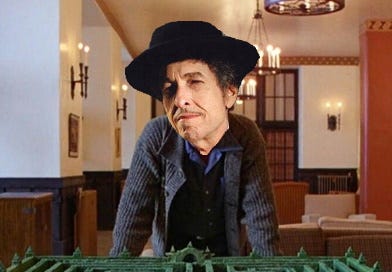Bob Dylan Is Weird #1: Murder Most Foul
Starting this series on the oddball genius of Bob Dylan, we look at 2020's "Murder Most Foul"
He’s an icon, but not like Sir Elton or Sir Mick or Sir Paul, or Bruce the working class multimillionaire, or some cash grab nostalgist. Bob Dylan is an enigma. In 2020 he released “Murder Most Foul,” an epic talk ballad about the JFK assassination and the cultural turns that followed. It’s seventeen minutes of freeform poetry, jive talk and jokes, musical references and conspiracies.
“Murder Most Foul” marks a return to ambitious eccentricity after two decades of more traditional blues and folk. His ‘60s epics like “Sad-Eyed Lady Of The Lowlands” and “Desolation Row” were leaning towers of absurd poetry, stacked high with allusion and insight. Only occasionally did he return to the long form, like on “New Danville Girl” (later released as “Brownsville Girl”) in the mid ‘80s, which brought the high poetry down to earth, meandering in near self-satire. Still I love those songs. No one else can do that, not like Dylan.
“Murder Most Foul” returns to the higher view. It has something important to tell us. But what? There are wisps of conspiracy, not just with the JFK murder but the cultural aftermath. Assassination details alternate with famous song titles, suggesting that we cope with grief via music. The president is killed just as the Beatles are set to hold the public’s hand. It’s a song full of provocative ideas, delivered with a wise old wink.
No matter how you view the JFK thing, let’s acknowledge - most conspiracy theorists are grifters, or just deluded narcissists. We should be searching for truths not just seeking to expose corruption. Why? Because corruption is an endless rabbit hole. You’ll just get lost, or come up dirty. Think of those FBI probes that go on for years and years, amassing evidence. Or the lone nut with a chalkboard map of dubious connections. To my mind Vincent Bugliosi closed the case on the JFK issue, partly by examining the psychology of why it was still “open.” But mostly by examining the evidence, while following the fantastic alternatives to their illogical conclusions.
“Murder Most Foul” is more about distractions. We can understand the JFK murder as a seminal event, like 9/11 with how it changed our narrative. How? The narrator doesn’t have an answer, other than some interjected song requests. It’s a device that really soars in the last verse, a stunning run of beat poetry packed with cultural references. Some of them are funny - “Play Don Henley play Glenn Frey/Take it to the Limit and let it go by.” And it sort of makes sense. Here’s another rabbit hole, a better one. Search for meaning by turning on the radio. It’s an hypnotic song, a meta solution in itself. That’s what Bob Dylan has always done.
Other than that, I can’t attempt to figure it out. I just listen humbly, like Donovan in that scene from Don’t Look Back. It’s my favorite piece of Dylan footage, a hotel room party from London in 1965. Donovan the folk singer plays a nice little song on the acoustic before passing it off to Dylan, who strums out “It’s All Over Now Baby Blue.” Which is one of his great masterpieces, either about the death of the American dream or the end of a relationship, something too big to wrap your arms around. So you just move on, and “take what you can gather from coincidence.” Poor Donovan listens with a look of awe and embarrassment. He’s not Bob Dylan, no one is.





